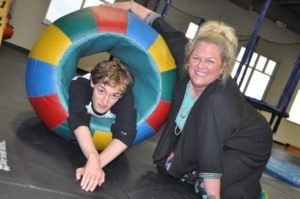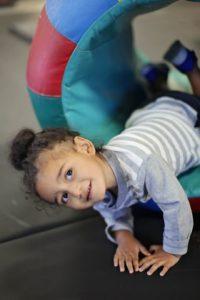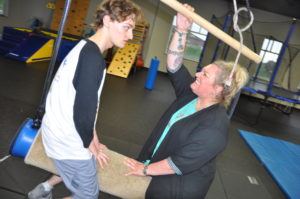Month: January 2019
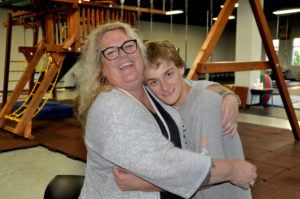 Jakob has always been a picky eater. For years, he would only eat four foods. Hot dogs, apple-cinnamon protein cereal, bananas and smoothies. Always a specific brand and flavor and he would never deviate. He’d smell his hot dogs every time just to make sure they were the right ones. I tried once to give him the same brand of hot dogs but they were organic instead of just antibiotic-free. He gave them a sniff and then refused to eat them. He was not happy with me that day.
Jakob has always been a picky eater. For years, he would only eat four foods. Hot dogs, apple-cinnamon protein cereal, bananas and smoothies. Always a specific brand and flavor and he would never deviate. He’d smell his hot dogs every time just to make sure they were the right ones. I tried once to give him the same brand of hot dogs but they were organic instead of just antibiotic-free. He gave them a sniff and then refused to eat them. He was not happy with me that day.
I couldn’t understand why he was being so stubborn. I mean, come on, who doesn’t want to eat cake? So I would try to be sneaky. I’d walk up behind him and smudge frosting on his lips, convinced that he’d love it if he would just taste it. Bad idea. He’d scream and gag and wipe his mouth. He’d be so upset. In hindsight, what I was doing was so rude and disrespectful. And I’m sure it had a negative effect on his trust in me. I’m so sorry about that, buddy.
What I didn’t realize at the time was eating and eliminating food were truly the only two things that kiddos on the spectrum have ultimate control over. In a world that they find so overwhelming and unpredictable where everything is out of their control, what can they do to feel like they have any say-so at all in their lives? Choose what goes in their mouths and when and where (bathroom, diaper, floor, on the bed) it comes out. I know of children who refuse to poop at all and it’s a big problem.
So before I even thought about attempting to add foods to his diet, I had to get him to loosen his grip on control with foods. To accomplish that, I started to give him more control in other places and I let him make some decisions. Which way do you want to go to Target, Tylersville or Liberty Way? Do you want to wear the black sweatpants or the grey ones? What do you want to do first, wash your face or brush your teeth?
In letting him choose, it became evident that in order for him to relax his need to control, I had to relax mine. Did it really matter to me which way we went to Target? No. But it mattered to Jakob.
After months of me letting go and him loving his newfound freedom and power, I began to consider approaching the new foods thing. The biggest obstacle was his limited ability to communicate. He couldn’t explain any of it to me, still can’t. I didn’t know how food was affecting him. Did it hurt his belly? Give him gas? Cause any pain at all? No clue. But I knew he suffered from occasional reflux and constipation. And he obviously was sensitive to smell so I made the assumption that his other senses involved with eating were heightened too. Touch, sight, taste and even hearing. The textures of the foods in his fingers, on his tongue, in his mouth. Maybe the colors or shapes of foods were appealing or unappealing to him. I had to consider flavors and whether food was sweet or savory or spicy. And I had to think about the sounds the food was making in his head as he chewed. Eating something crunchy makes a very different noise than sucking something though a straw. A lot to consider.
I decided to start with foods that were similar to what he was already eating. I started with chicken hot dogs (he already ate beef) and crackers (crunchy like cereal). I approached him with a calendar (which he loved) and I gave him a bunch of foods to choose from. He’d pick the foods and then the dates and times he would eat the new foods. We’d write it down on the calendar and when the day came, he would eat it. Eventually we added more foods and he’d take at least one bite (number of bites was also negotiable).
With every new food, he would look at it for a long time. He’d smell it, touch it, move it around with his fork. And as soon as he’d put it in his mouth, he’d gag. Every time. It wasn’t easy for him and he didn’t like everything. But he would try it and I would celebrate his efforts like he’d just won a gold medal at the Olympics. In our world, he had.
Jakob trying new foods was a little bit about food and a whole lot about my beliefs about why he was so picky and stubborn. He wasn’t the one who was being stubborn and picky, I was. And once I figured that out, it was easy as cake.
Read MoreWhat is it?
A tool to help parents know what their child should be doing and when. 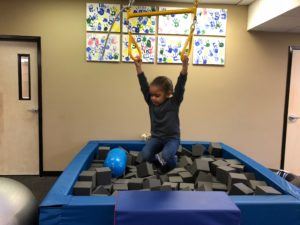
How does it work?
It is simple. Simply plug in your child’s birthdate. The gross motor, fine motor, language and sensory tasks that your child should do at that age will pop up. Answer the questions indicating what your child can and cannot do.
After submitting the tool, you will receive an email with tips and tricks on how to help your child at home. You also receive a FREE developmental checklist of all the skills a child should do between the ages of 1 and 6 years old.
Practice these age appropriate skills with your child. We hope you have success challenging them!
Let us know if we can help you.
Why did ABC Pediatric Therapy develop this tool?
ABC found that many parents do not know what to encourage and when. We want to help! This tool will teach you what toys to have and what skills to challenge at what age. Educate yourself! Be the best parent you can be! Challenge your child’s skills!
Who would find this tool useful?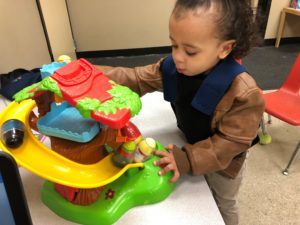
Any parent of a child under the age of 6 years old.
You can find this Interactive Screening Tool at checklist.abcpediatrictherapy.com. We hope you find it useful!
Visit our website at https://www.abcpediatrictherapy.com for more information on child development.
Read More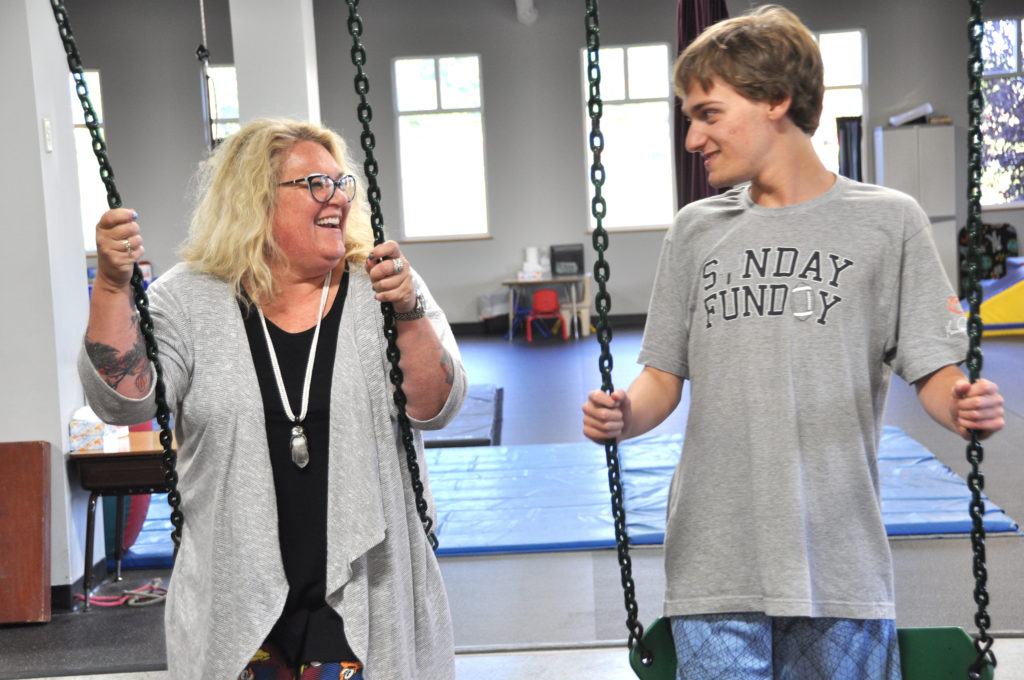 At Jakob’s first IEP meeting when he was three, his teacher asked me what goals I had for him. I had no clue. I mean I knew I wanted him to be better. To be happier. To act more like other kids his age, you know, the “normal” ones. Seeing the end results I wanted was easy. Creating a plan for how to get there was not. In that initial meeting while I sat in a chair made for a toddler, the only goal I could come up with was “drink out of a cup.”
At Jakob’s first IEP meeting when he was three, his teacher asked me what goals I had for him. I had no clue. I mean I knew I wanted him to be better. To be happier. To act more like other kids his age, you know, the “normal” ones. Seeing the end results I wanted was easy. Creating a plan for how to get there was not. In that initial meeting while I sat in a chair made for a toddler, the only goal I could come up with was “drink out of a cup.”
After fourteen years of practice and lots of work to understand, it’s easier. I can look at Jakob and see where he is and where I’d love to see him go next. A lot of the time, I even know what we can do to help get him there. Back then the process was frustrating and scary, now it’s exciting and fun.
The biggest struggle for me in the beginning was coming to the realization that accepting where he was didn’t mean that I believed he wasn’t capable of doing or being more. Acceptance doesn’t mean losing faith or giving up hope. It means seeing without judgment what is right in front of me. And the only way to make a plan for where I wanted us to go was to really understand where we were. Once I got a good handle on that, we were ready to proceed.
The other big shift in my thinking had to do with expectations and attaching to outcomes. After learning to accept that Jakob was right where he was with communication and eye contact and flexibility and behaviors, I also had to accept that nothing may ever change. Where he was in each of those moments that he didn’t seem to notice I was in the same room or when he would scream and cry for reasons that weren’t apparent to me, may be exactly where he was going to stay forever. I had no way of knowing. Just because I wanted him to learn new things and that there would be a whole team of people trying to teach him those things didn’t mean he was going to learn them. I remained hopeful, with no expectations. And if I was to do all of that with an open and loving heart, I had to be ok if nothing did change. I had to do all of the goal setting and planning and teaching with no attachment to the outcome. If he learned something new, great! If nothing changed, great! Either way, I would continue to love and not judge and accept. And I would keep trying.
I think it’s really easy to get all caught up in the “should-be” thinking with our special kids. So much so that we miss the possible what-may-be’s. He should be looking in my eyes (maybe it’s hard for him to listen to what I’m saying if he has to look at me too). He should be eating more vegetables (maybe they’re hurting his stomach and he just can’t tell me). He should be riding a bicycle (maybe his whole world spins when his feet leave the ground and he gets terrible vertigo). When we put “should-be” pressure on ourselves and them, we all suffer.
Accept where your child is. Don’t judge them (or you) if they don’t change. And love love love them no matter what. If you’re able to do that, it’s easy to set goals and you’ll have so much fun helping them reach them. Or not reach them. Either way, you’re living a life filled with unconditional love.
Read MoreEver wonder what you would write if you could write a letter to your child?
Our children are our most precious gift. What would you say if you were to write a letter to your child?
I know I would want to inspire. I would not tell them they can be anything they want to be. Instead I would teach them to truly inspect. What are you good at? What are you not so good at? Do more of what you are good at. Learn more about what you like. Network with those who do what you want to do. Then go after it. Do not stop until your goals are met.
Teach them that by helping others you help yourself.
Know thyself. Know what you want and what you need and go after it.
Set goals. Don’t just set goals. Strive to reach them. Make it NOT an option NOT to meet them. Break long term goals into several short term goals and go after them all.
Let them know that problems are just barriers to be overcome.
Encourage each to own their mistakes/their problems and learn from them rather than blame others. This will push you to be the leader I know you can be. You will learn to break a problem down into tasks to be completed and soon the problem becomes a solution. Then this child will look at each problem as merely an inconvenience that will be overcome. Each problem will be a barrier that they will remove. My child will be able to minimize the stress in their life as they will be able to solve problems.
I will show them that communication is vital to any successful relationship. In fact, believe it is the reason most relationships fail. Know your wants and needs so you can communicate them to those that are important to you. Then be a good listener. Understand the wants and needs of those important to you and work to meet them. Be flexible as wants and needs can and will change on both sides. That is ok. Just be open to change and be willing to do your best to give those you love what they need.
Above all love. Love in abundance and it will come back to you.
What would you write in the letter to your child?
Read More
 Skip to content
Skip to content
